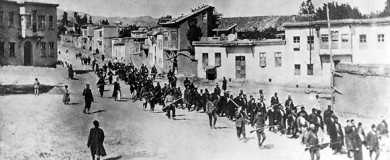Pamela Geller
Pamela Geller is the editor and publisher of the Atlas Shrugs website and is former associate publisher of the New York Observer. She is a regular columnist at Newsmax and her Op-Eds appear in the Washington Times, Human Events, the American Thinker, Israel National News, and other publications.

Another stunning rebuke to Barack Obama: Armenian American groups have for decades sought Congressional recognition as genocide of the murder of just under two million Armenian Christians by the Islamic Ottoman Empire. Last week, they cleared an important hurdle in getting this recognition: the House Foreign Affairs Committee, over Obama’s opposition, approved a resolution calling the Turkish mass murder of the Armenians a genocide.
The Islamic supremacists haven’t infiltrated as deeply as they thought. As long as Turkey was secular, we pretended it wasn’t genocide. And now Turkish Prime Minister Recep Tayyip Erdogan, who once said that “there is no moderate or immoderate Islam, Islam is Islam and that’s it,” is taking on the secular military in Turkey. Traditionally, the secular army kept Turkey a “moderate” secular Muslim country, but with the election of the devout Muslim Erdogan, Turkish secularism is on the ropes. And now that Turkey is returning to the dark side, we don’t have to lie for jihadis anymore.
The Turks were furious over the Foreign Affairs Committee vote, and withdrew their ambassador to the U.S. Turkish President Abdullah Gul issued a veiled threat: “Turkey will not be responsible for the negative results that this event may lead to.”
Turkey threatens…what? Another genocide?
This should be interesting. Obviously the Muslim world thinks it can bully the U.S. President. Let’s watch and see if Obama heeds the decent and humane call from the American people, or heeds Islam.
Unfortunately, the answer is already clear. The committee’s vote is difficult for the Islamophilic Obama. He campaigned on the promise that he would officially recognize the Turkish mass murders of Armenians as a genocide. As with so many of his other promises, Obama lied and has backtracked since he became President, as Secretary of State Hillary Rodham Clinton admitted Thursday: “Circumstances have changed in very significant ways,” she said. And she said that the Obama Administration would oppose the resolution as it goes to Congress:
We do not believe that the full Congress will or should act upon that resolution and we have made that clear to all the parties involved.
Change you can’t believe in.
And my, isn’t Turkey very thin-skinned and sensitive, considering its propensity for genocide? The Turks should be busying themselves apologizing and making amends, as Germany did after World War II. But no. Instead the non-Muslim world is still stepping and fetching and covering up for over a millennium of jihad wars, land expropriations, enslavements, and humiliations of the conquered non-Muslim populations on three continents — and genocide.
Abdullah Gul also said:
We are determined to normalise Turkish-Armenian ties but we are against this being secured through the intervention of third parties and through pressure.
This is rich. How can you normalize relations when you mass murdered close to two million of the Armenian people and won’t admit it, or express regret and apologize? It was a genocide, and the covering up of Islamic genocides must end.
Let us not forget the other Christian minorities who were massacred in the same way and for the same reason. Approximately 250,000 Assyrian-Chaldeans were massacred, as well as 250,000 Greeks. Countless others were forced to convert to Islam, especially young girls. Another thing we should remember about this period is that Greece itself was occupied by the Ottoman empire for centuries, as well as Bulgaria and so on, and the non-Muslim populations in all those countries were terrorized for centuries. These nations were only freed because of World War I and the collapse of the Ottoman empire.
This is a history we must not forget.
Above all, we must not forget that the Nazis were inspired by the Armenian genocide.
The Turks used primitive gas chambers and developed other murderous templates that were later adopted by the Nazis. Hitler was inspired by the Mufti of Jerusalem, Hajj Amin al-Husseini, who was an officer of the Ottoman empire who participated in the Armenian genocide, and who during World War II met with Hitler and frequently with high Nazi officials. During the Nuremberg Trials in July 1946, Adolf Eichmann’s assistant, Dieter Wisliczeny, testified that Mufti was a central figure in the planning of the genocide of the Jews:
The Grand Mufti has repeatedly suggested to the Nazi authorities – including Hitler, von Ribbentrop and Himmler – the extermination of European Jewry. … The Mufti was one of the initiators of the systematic extermination of European Jewry and had been a collaborator and adviser of Eichmann and Himmler in the execution of this plan… He was one of Eichmann’s best friends and had constantly incited him to accelerate the extermination measures.
Covering for Islam’s acts of genocide encourages more Islamic genocide. Think Sudan. Congress should recognize the Armenian genocide for what it was, and call on the Turks to stop covering up and take responsibility for what they did. Barack Obama should do the same thing.
And the media should finally tell the truth.






